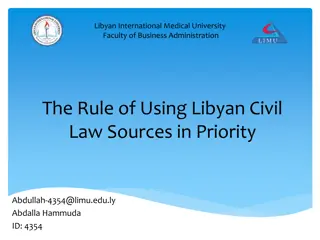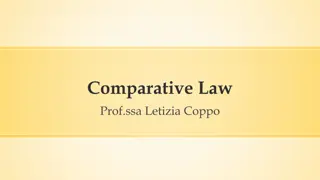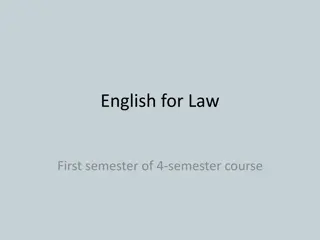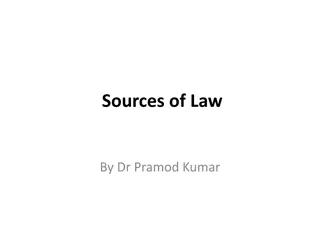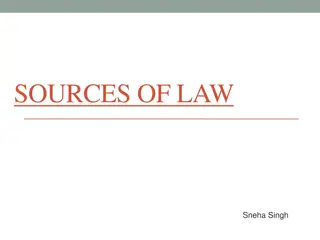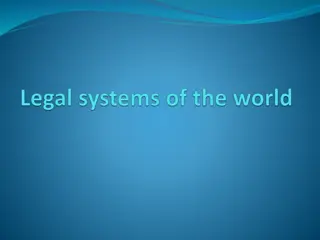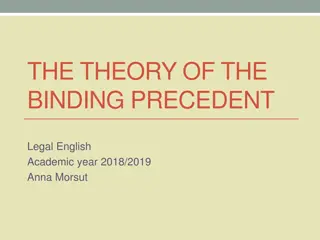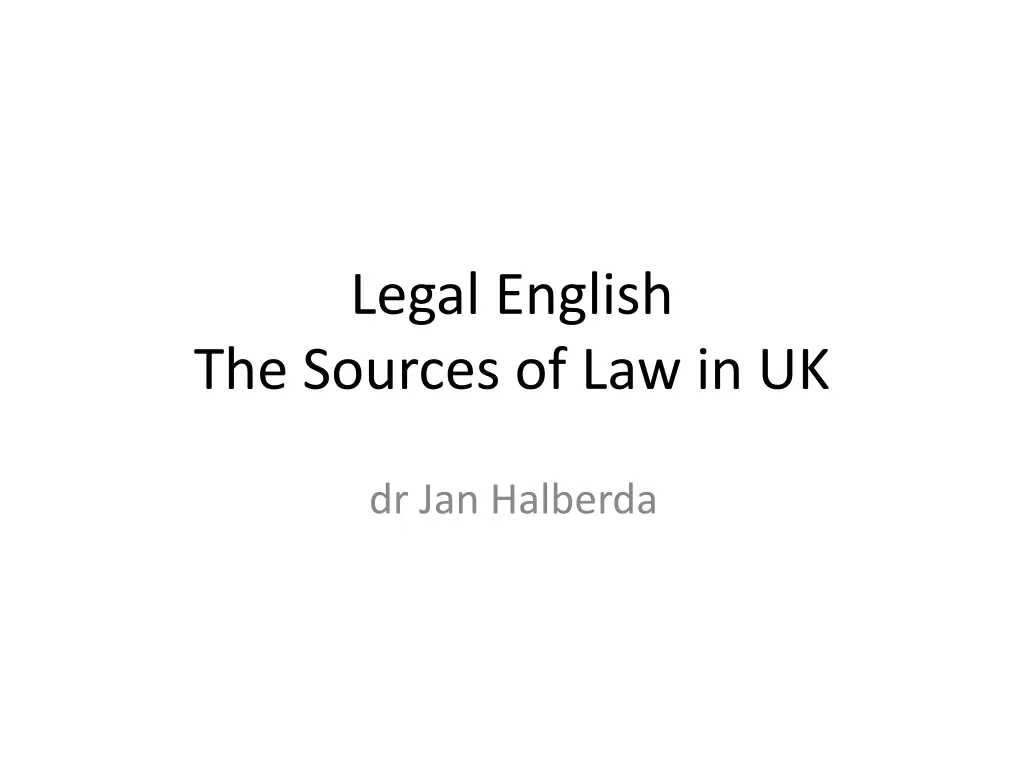
Understanding the Sources of Law in the UK
Explore the diverse sources of law in the UK, including the Constitution, EU law, statutes, common law, and more. Learn about key legislations such as the European Union (Withdrawal) Act and the Human Rights Act, shaping the legal landscape of the UK.
Download Presentation

Please find below an Image/Link to download the presentation.
The content on the website is provided AS IS for your information and personal use only. It may not be sold, licensed, or shared on other websites without obtaining consent from the author. If you encounter any issues during the download, it is possible that the publisher has removed the file from their server.
You are allowed to download the files provided on this website for personal or commercial use, subject to the condition that they are used lawfully. All files are the property of their respective owners.
The content on the website is provided AS IS for your information and personal use only. It may not be sold, licensed, or shared on other websites without obtaining consent from the author.
E N D
Presentation Transcript
Legal English The Sources of Law in UK dr Jan Halberda
The Sources of Law Constitution EU law Retained EU law European Convention of Human Rights Statutes Common law Books of authority Custom
Constitution No single authoritative text Constitutional statutes Common law rules Conventions, constitutional practice
EU law Member since 1973 European Communities Act 1972 European Union Act 2011 European Union (Withdrawal) Act 2018 Brexit
EU Law European Union (Withdrawal) Act 2018 European Union (Withdrawal) Act 2019 European Union (Withdrawal) (no 2) Act 2019 (Current ) Exit day is 31 January 2020 at 11.00 p.m. EU Law Retained EU Law Henry VIII clauses
European Convention of Human Rights The Human Rights Act (1998) The declaration of incompatibility
The Statute Law Henry II, Edward I (English Justinian) Magna Charta (1215) Habeas Corpus Act (1679) Bill of Rights (1689) Act of Settlement (1701) Parliament Acts (1911, 1949)
The Statute Law European Communities Act (1972) The devolution statutes (Scotland Act 1998, Government of Wales 1998, Northern Ireland Act 1998) The Human Rights Act (1998) The House of Lords Act (1999) Constitutional Reform Act (2005) European Union (Withdrawal) Acts (2018-2019)
The Statute Law The Statute of Limitations (1621) The Statute of Frauds (1677) The Sale of Goods Act (1893) Consolidation acts (19th-20th cc.)
The Statute Law The Parliamentary sovereignty: Parliament can make laws concerning anything. No Parliament can bind a future parliament. A valid Act of Parliament cannot be questioned by the court. Parliament is the supreme lawmaker.
The Common Law Several meanings of common law : common law versus civil law common law versus statute law common law versus equity law common law versus local law
The Common Law Judge-made law, case law, The general principles of law Medieval forms of action Rule of precedent
The Supreme Court The Curia Regis The Westminster Courts: The Court of Common Pleas, The Court of King s Bench, The Court of Exchequer VERSUS Court of Chancery The House of Lords The Jucicial Commitee of the Privy Council The Supreme Court
The forms of action Similar to the Roman actiones Writ of right Writ of debt Writ of detinue Writ of account Writ of covenant Writ of assumpsit Writ of trespass
Writ of right (XII c.): The king to the sheriff greeting. Command (Praecipe) N. that without delay he render to R. one hide of land in such-and-such a village, of which the said R. complains that the aforesaid N. has dispossessed him; and unless he do so, summon him by good summoners to attend before me or my justices to show why he has failed to do this.
Writ of trespass Rattlesdene vs Grunestone (1317): the aforesaid Richard and Mary with force and arms drew off a great part of wine from the aforesaid tun, and instead of the wine so drawn off they filled the tun with salt water so that all the wine became rotten and was altogether destroyed to the grave damage to this Simon and against the [king s] peace ;
Writ of trespass Colan vs West (1367): with force and arms, namely swords etc., he so improvidently drove a certain cart , that a certain piece of timber fell upon the aforesaid Christine and knocked her to the ground against the peace of the lord king .
The Common Law The common law versus equity law History of courts (Westmister vs Court of Chancery) Forms of action, writs Glanville s case 1615 Judicature Acts 1873-1875
The Common Law Rule of precedent The declaratory theory of common law Stare decisis Ratio decidendi Obiter dictum
Leading cases Rylands v. Fletcher, 1868, Donoghue v. Stevenson,1932 Moses v. MacFerlan, 1760
The Common Law Binding force of precedent (horizontal vs vertical) Precedent vs principle London Street Tramways v. L.C.C., 1898 Practical Statement 1966
Custom Common law versus customary law Danelaw Kent law (gavelkind)
Books of authority Ranulf Glanville, Treatise on the Laws and Customs of the Realm of England, 1189 Henry Bracton, On the Laws and Customs of England, 1250 Thomas Littleton, Treatise on Tenures (1481) Edward Coke, Institutes of the Lawes of England (17th c.), William Blackstone, Commentaries on the Laws of England (1765-1769)
Books of authority As for a drunkard who is volontarius daemon, he hath (as hath beene said) no priviledge thereby If an ideot make a feoffment in fee, he shall in pleading never avoid it by saying that hee was an ideot at the time of his feoffment... (Co.Litt. 247a.) ...our book cases are the best proof what the law is, Argumentum ab authoritate est fortissimum in lege. (Co.Litt. 254a.)
Books of authority Chitty on Contracts (1826, 31st ed. 2013), Stephen s New Commentaries (1841, until half of 20th c.), Goff and Jones, The Law of Restitution (since 1966)


